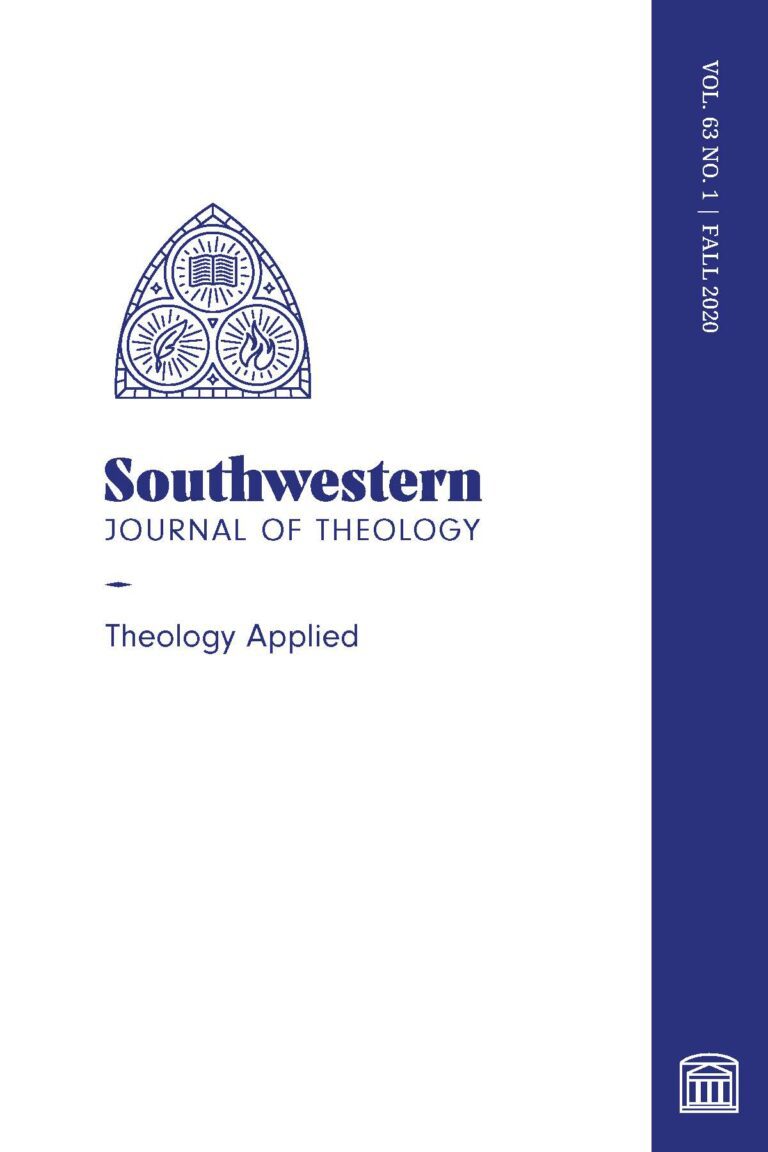
Theology Applied
Southwestern Journal of Theology
Volume 63, No. 1 – Fall 2020
Editor: David S. Dockery
By Kyle R. Hughes. Eugene, OR: Cascade Books, 2020, vii+162pp., $23.00
This volume by Kyle R. Hughes, History Department chair at Whitefield Academy in Atlanta, carries on his project that started with The Trinitarian Testimony of the Spirit: Prosopological Exegesis and the Development of Pre-Nicene Pneumatology (Brill, 2018). In that work, he primarily focused on the development of early Christian pneumatology in Justin, Irenaeus, and Tertullian. In this present work, Hughes surveys the development of pneumatology from Pentecost to the Council of Constantinople using the illustration of a mosaic that was built tile by tile into a full divine pneumatology.
In the first chapter, Hughes tackles “The Problem of the Holy Spirit.” Here, he introduces the issue by noting the difficulty artists and iconographers face with respect to the Holy Spirit. For the Father and Son, there is a type of personification in biblical portrayals that artists can draw (for example, the Father as an old man with a white beard or a depiction of the Son incarnate). However, aside from a dove, the Spirit is often portrayed inanimately as one who is “poured out” or “fills.” Given that these depictions might lend one toward seeing the Spirit as some sort of force rather than person, Hughes notes that interpreters had a less difficult task in talking about the Father and Son as personal beings. Nonetheless, the early church eventually settled on the Trinitarian formula of one God in three persons.
In chapter two, Hughes asserts that the Gospel of John in particular offers the clearest biblical portrait of the Spirit’s distinct personhood. In particular, “The Johannine presentation of the Paraclete sets up an enormously important idea that will be of great significance for later Christian writers’ theology of the Holy Spirit” (p. 22), namely the Spirit’s prosopological speech in divine revelation. Chapter three focuses principally on the Epistle of Barnabas and the work of Justin Martyr, showing the Old Testament’s testimony to the Spirit as the linchpin for developing a specific Christian identity over and against Judaism.
Chapter four is in many ways a condensed argument from The Trinitarian Testimony of the Spirit, in which Hughes lays out the development of the Spirit as a divine person in the theologies of Justin Martyr, Irenaeus, and Tertullian. Hughes shows that these early Christian theologians made important contributions to second- and third-century pneumatological development by making “use of an ancient person-centered reading strategy that scholars have termed prosopological exegesis” that personified the Spirit in particular biblical texts in which he seemed to be speaking in a distinct, volitional manner (p. 74). In chapter five, Hughes furthers the discussion by giving attention to the divine economy “tile” Irenaeus, Tertullian, and Origen contribute to the development of a pneumatological mosaic. Origen’s conclusions about the Spirit’s role in divine revelation, Hughes asserts, especially laid the foundation for later Christians to describe the Spirit as an eternally present person with the Godhead.
Chapter six pulls the pneumatological development together, noting chiefly how Athanasius, Didymus the Blind, and Basil of Caesarea helped codify the pro-Nicene articulation of the Spirit’s full divinity. Hughes notes that Athanasius “broke a long tradition of subordinationism in affirming the coequality of the Spirit with the Father and the Son, emphasizing the unity of action and identity in the Trinity” (p. 128). That said, Hughes asserts that Didymus and Basil helped clarify that which Athanasius left “somewhat under-developed” through reflections on the Spirit’s role in sanctification and liturgy. The seventh chapter acts as a conclusion, encouraging Christians to receive “the invitation of the Spirit: to make space in our lives for the Spirit’s life-giving breath to create in us the very character of Christ, by which we may behold God face-to-face” (p. 139).
The strengths of this book are legion—from its succinctness to its clarity to its theological precision—but its greatest contribution is its avoidance of generalizing early pneumatological development. While nominalism can die the death of a thousand qualifications, Hughes finds the balance between surveying the development, while also deftly noting the nuances in the articulations of certain theologians and time periods in the first five centuries of Christian pneumatological reflection. This type of careful work is difficult in such a brief space of under 150 pages, and yet Hughes accomplishes this task exceptionally well. The only major critique worth noting is the lack of attention to the two Gregories. Of the Cappadocians, Basil is an obvious forerunner to Gregory of Nazianzus and Gregory of Nyssa; however, in a chapter in which Hughes seeks to show the final major development of a fully divine pneumatology, he under-emphasizes the two men—Nazianzus earns two citations and Nyssa earns zero—who fleshed out Basil’s theology with the most rigor. If one were seeking to put a bow on the development of fully divine pneumatology, Nazianzus and/or Nyssa would have been more apt as the final tiles to the mosaic.
Hughes notes that his audience is broad, aiming at scholars, pastors, students, and laypersons (p. 13). He accomplished this task wonderfully, balancing scholarly rigor with accessible and clear prose and storytelling. This book is recommended for anyone seeking to understand how and why Christians confess the Holy Spirit’s full divinity.





